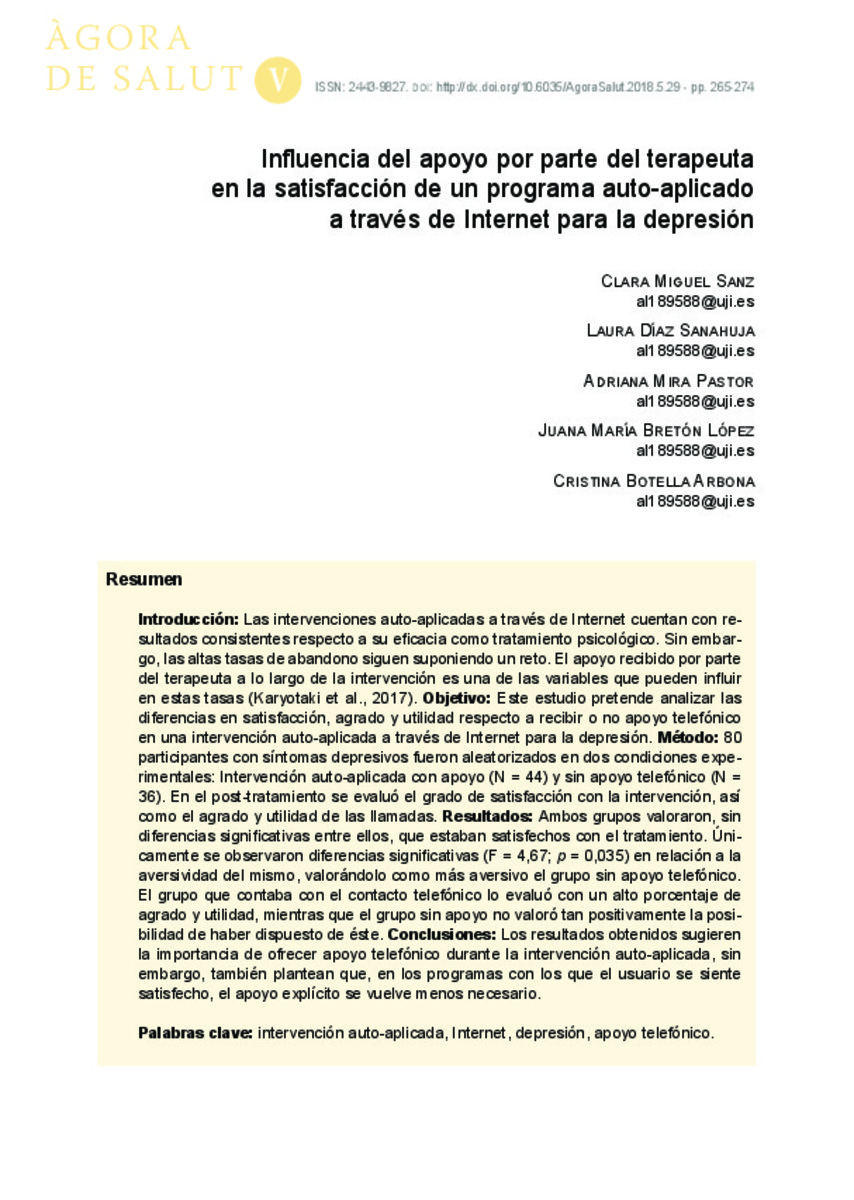| dc.contributor.author | Miguel Sanz, Clara | |
| dc.contributor.author | Díaz-Sanahuja, Laura | |
| dc.contributor.author | Mira, Adriana | |
| dc.contributor.author | Bretón-López, Juana | |
| dc.contributor.author | Botella, Cristina | |
| dc.date.accessioned | 2018-06-11T09:22:25Z | |
| dc.date.available | 2018-06-11T09:22:25Z | |
| dc.date.issued | 2018 | |
| dc.identifier.citation | MIGUEL SANZ, Clara; et al. Influencia del apoyo por parte del terapeuta en la satisfacción de un programa auto-aplicado a través de Internet para la depresión. Agora de salut, 2018, vol. 5, p. 265-274 | ca_CA |
| dc.identifier.issn | 2443-9827 | |
| dc.identifier.uri | http://hdl.handle.net/10234/175075 | |
| dc.description | III Jornades d’Investigació per a l’Alumnat de la Facultat de Ciències de la Salut | |
| dc.description.abstract | Introducción: Las intervenciones auto-aplicadas a través de Internet cuentan con resultadosconsistentes respecto a su eficacia como tratamiento psicológico. Sin embargo,las altas tasas de abandono siguen suponiendo un reto. El apoyo recibido por partedel terapeuta a lo largo de la intervención es una de las variables que pueden influiren estas tasas (Karyotaki et al., 2017). Objetivo: Este estudio pretende analizar lasdiferencias en satisfacción, agrado y utilidad respecto a recibir o no apoyo telefónicoen una intervención auto-aplicada a través de Internet para la depresión. Método: 80participantes con síntomas depresivos fueron aleatorizados en dos condiciones experimentales:Intervención auto-aplicada con apoyo (N = 44) y sin apoyo telefónico (N =36). En el post-tratamiento se evaluó el grado de satisfacción con la intervención, asícomo el agrado y utilidad de las llamadas. Resultados: Ambos grupos valoraron, sindiferencias significativas entre ellos, que estaban satisfechos con el tratamiento. Únicamentese observaron diferencias significativas (F = 4,67; p = 0,035) en relación a laaversividad del mismo, valorándolo como más aversivo el grupo sin apoyo telefónico.El grupo que contaba con el contacto telefónico lo evaluó con un alto porcentaje deagrado y utilidad, mientras que el grupo sin apoyo no valoró tan positivamente la posibilidadde haber dispuesto de éste. Conclusiones: Los resultados obtenidos sugierenla importancia de ofrecer apoyo telefónico durante la intervención auto-aplicada, sinembargo, también plantean que, en los programas con los que el usuario se sientesatisfecho, el apoyo explícito se vuelve menos necesario. | ca_CA |
| dc.description.abstract | Introduction: Self-applied interventions via the Internet have shown consistent resultsregarding their efficacy as psychological treatment. However, they are characterized bya high dropout rate. This issue can be influenced by the support the therapist offersthroughout the intervention (Karyotaki et al., 2017). Objective: This study intends toanalyse whether «satisfaction», liking and «utility» indexes are different between patientsreceiving or not this telephone support during a self-applied intervention for depressionvia the Internet. Methods: 80 participants presenting depressive symptomswere randomized in two experimental conditions: Self-applied interventions via the Internetwith and without telephone support (N = 44 and N = 36, respectively). When thetreatment was finished, satisfaction with the intervention, and liking and utility degreeof these calls were evaluated. Results: No significant differences were observed betweengroups in terms of satisfaction, being both groups satisfied with the treatment.Significant differences were only found on treatment aversion (F = 4.67; p = 0.035),being considered more aversive by the group without telephone support. The group thatreceived telephone support assessed this human intervention with a high percentageof satisfaction and utility, while the group without this kind of support did not appreciatethe possibility of having this contact. Conclusions: Present results suggest the importanceof offering support during the self-applied intervention. However, they also pointout that in programs in which participants feel satisfied, explicit support becomes lessnecessary. | ca_CA |
| dc.format.extent | 10 p. | ca_CA |
| dc.format.mimetype | application/pdf | ca_CA |
| dc.language.iso | spa | ca_CA |
| dc.publisher | Publicacions de la Universitat Jaume I. Servei de Comunicació i Publicacions | ca_CA |
| dc.relation.isPartOf | Àgora de salut, 2018, vol. 5 | ca_CA |
| dc.rights | © Del text: els autors i les autores, 2018
© D’aquesta edició: Publicacions de la Universitat Jaume I, 2018 | ca_CA |
| dc.rights.uri | http://creativecommons.org/licenses/by-sa/4.0/ | * |
| dc.subject | intervención auto-aplicada | ca_CA |
| dc.subject | Internet | ca_CA |
| dc.subject | depresión | ca_CA |
| dc.subject | apoyo telefónico | ca_CA |
| dc.subject | self-applied intervention | ca_CA |
| dc.subject | Internet | ca_CA |
| dc.subject | depression | ca_CA |
| dc.subject | human support | ca_CA |
| dc.title | Influencia del apoyo por parte del terapeuta en la satisfacción de un programa auto-aplicado a través de Internet para la depresión | ca_CA |
| dc.type | info:eu-repo/semantics/article | ca_CA |
| dc.identifier.doi | http://dx.doi.org/10.6035/AgoraSalut.2018.5.29 | |
| dc.rights.accessRights | info:eu-repo/semantics/openAccess | ca_CA |








